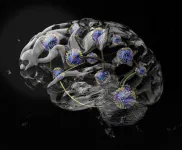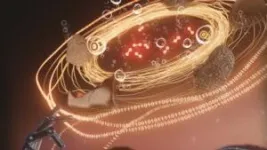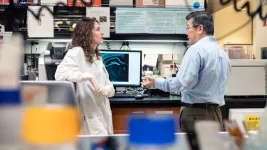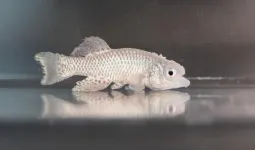(Press-News.org) A form of brain-inspired computing that exploits the intrinsic physical properties of a material to dramatically reduce energy use is now a step closer to reality, thanks to a new study led by UCL and Imperial College London researchers.
In the new study, published in the journal Nature Materials, an international team of researchers used chiral (twisted) magnets as their computational medium and found that, by applying an external magnetic field and changing temperature, the physical properties of these materials could be adapted to suit different machine-learning tasks.
Such an approach, known as physical reservoir computing, has until now been limited due to its lack of reconfigurability. This is because a material’s physical properties may allow it to excel at a certain subset of computing tasks but not others.
In the new study, published in the journal Nature Materials, an international team of researchers used chiral (twisted) magnets as their computational medium and found that, by applying an external magnetic field and changing temperature, the physical properties of these materials could be adapted to suit different machine-learning tasks.
Dr Oscar Lee (London Centre for Nanotechnology at UCL and UCL Department of Electronic & Electrical Engineering), the lead author of the paper, said: “This work brings us a step closer to realising the full potential of physical reservoirs to create computers that not only require significantly less energy, but also adapt their computational properties to perform optimally across various tasks, just like our brains.
“The next step is to identify materials and device architectures that are commercially viable and scalable.”
Traditional computing consumes large amounts of electricity. This is partly because it has separate units for data storage and processing, meaning information has to be shuffled constantly between the two, wasting energy and producing heat. This is particularly a problem for machine learning, which requires vast datasets for processing. Training one large AI model can generate hundreds of tonnes of carbon dioxide.
Physical reservoir computing is one of several neuromorphic (or brain inspired) approaches that aims to remove the need for distinct memory and processing units, facilitating more efficient ways to process data. In addition to being a more sustainable alternative to conventional computing, physical reservoir computing could be integrated into existing circuitry to provide additional capabilities that are also energy efficient.
In the study, involving researchers in Japan and Germany, the team used a vector network analyser to determine the energy absorption of chiral magnets at different magnetic field strengths and temperatures ranging from -269 °C to room temperature.
They found that different magnetic phases of chiral magnets excelled at different types of computing task. The skyrmion phase, where magnetised particles are swirling in a vortex-like pattern, had a potent memory capacity apt for forecasting tasks. The conical phase, meanwhile, had little memory, but its non-linearity was ideal for transformation tasks and classification – for instance, identifying if an animal is a cat or dog.
Co-author Dr Jack Gartside, of Imperial College London, said: “Our collaborators at UCL in the group of Professor Hidekazu Kurebayashi recently identified a promising set of materials for powering unconventional computing. These materials are special as they can support an especially rich and varied range of magnetic textures. Working with the lead author Dr Oscar Lee, the Imperial College London group [led by Dr Gartside, Kilian Stenning and Professor Will Branford] designed a neuromorphic computing architecture to leverage the complex material properties to match the demands of a diverse set of challenging tasks. This gave great results, and showed how reconfiguring physical phases can directly tailor neuromorphic computing performance."
The work also involved researchers at the University of Tokyo and Technische Universität München and was supported by the Leverhulme Trust, Engineering and Physical Sciences Research Council (EPSRC), Imperial College London President’s Excellence Fund for Frontier Research, Royal Academy of Engineering, the Japan Science and Technology Agency, Katsu Research Encouragement Award, Asahi Glass Foundation, and the DFG (German Research Foundation).
END
Twisted magnets make brain-inspired computing more adaptable
A form of brain-inspired computing that exploits the intrinsic physical properties of a material to dramatically reduce energy use is now a step closer to reality, thanks to a new study led by UCL and Imperial College London researchers.
2023-11-13
ELSE PRESS RELEASES FROM THIS DATE:
New heat map charts unequal civic opportunity in the US
2023-11-13
People in many parts of the United States possess few chances for the robust community engagement that underpins healthy democracies, according to a new report that for the first time maps civic opportunity across the country.
The heat map created by Johns Hopkins University’s SNF Agora Institute, reveals patterns of inequality in civic opportunity tied to race, class, immigration status and education. Researchers also found that a great deal of civic engagement happens through local faith institutions and social and fraternal organizations, not D.C.-based advocacy organizations that tend to carry political clout.
The report is the initial phase ...
One step closer to Mars immigration
2023-11-13
Immigration to and living on Mars have long been depicted in science fiction works. But before dream turns into reality, there is a hurdle man has to overcome -- the lack of essential chemicals such as oxygen for long-term survival on the planet. However, hope looms up thanks to recent discovery of water activity on Mars.
Scientists are now exploring the possibility of decomposing water to produce oxygen through electrochemical water oxidation driven by solar power with the help of oxygen evolution reaction (OER) catalysts. The challenge is to find a ...
National survey indicates more young adults begin tobacco use with vaping, not cigarettes
2023-11-13
Young adults are now more likely to vape than to use traditional cigarettes. After years of public health success in decreasing the numbers of people using cigarettes, researchers are seeing striking increases in the numbers of young people who use e-cigarettes regularly – so much so that, for the first time, there are more young people who begin to use nicotine through vaping rather than through cigarettes.
“We now have a shift such that there are more ‘never smokers’ who vape than established smokers,” ...
Widening gender gap in life expectancy in the US
2023-11-13
About The Study: This analysis finds that COVID-19 and the drug overdose epidemic were major contributors to the widening gender gap in life expectancy (nearly six years) between women and men in recent years. Men experienced higher COVID-19 death rates for likely multifactorial reasons, including higher burden of comorbidities and differences in health behaviors and socioeconomic factors, such as labor force participation, incarceration, and homelessness. Differentially worsening mortality from diabetes, heart disease, homicide, and suicide suggest that chronic metabolic disease and mental illness may also contribute.
Authors: Brandon W. Yan, M.D., ...
Shift from smoking cigarettes to vaping nicotine in young adults
2023-11-13
About The Study: The data from this nationally representative survey study reveal a shift in tobacco use among young adults (ages 18-24), showing historically low cigarette use, which has positive public health significance. However, e-cigarette use is higher (14.5%) than reported previously, coinciding with the introduction of salt-based devices in 2015 to 2018. Over half of established vaping young adults never regularly smoked. Research suggests that exclusive e-cigarette users are unlikely to ...
Trends in prevalence of breastfeeding initiation and duration among US children
2023-11-13
About The Study: The findings of this study indicate an increase in the prevalence of breastfeeding initiation and breastfeeding duration at 12 months from 1999 to 2018 in the U.S. Temporal changes of breastfeeding duration at 12 months were more prevalent among male infants, older mothers, Mexican American and multiracial participants, and households with higher income.
Authors: Yongjun Zhang, Ph.D., M.D., of the Shanghai Jiao Tong University School of Medicine in Shanghai, is the corresponding author.
To access ...
Study finds melatonin use soaring among youth
2023-11-13
Nearly one in five school-aged children and preteens now take melatonin for sleep, and some parents routinely give the hormone to preschoolers, according to new research from the University of Colorado Boulder published Nov. 13 in JAMA Pediatrics.
This concerns the authors, who note that safety and efficacy data surrounding the products are slim, such dietary supplements lack full regulation by the Food and Drug Administration.
“We hope this paper raises awareness for parents and clinicians, and sounds the alarm for the scientific community,” said lead author Lauren Hartstein, PhD, a postdoctoral fellow ...
How good can overpower evil in the genetic determination of Alzheimer’s disease
2023-11-13
San Francisco—November 13, 2023—Researchers at Gladstone Institutes have discovered that a rare genetic variant known as the “Christchurch mutation” can block detrimental effects of apolipoprotein E4, the best-established risk factor for the most common form of Alzheimer’s disease.
The apolipoprotein E (APOE) gene has long been known to affect the risk of Alzheimer’s disease through its three main variants: E2 (low risk), E3 (intermediate risk), and E4 (high risk). More recently, a ...
Recreation of ancient seawater reveals which nutrients shaped the evolution of early life
2023-11-13
Scientists know very little about conditions in the ocean when life first evolved, but new research published in Nature Geoscience has revealed how geological processes controlled which nutrients were available to fuel their development.
All life uses nutrients such as zinc and copper to form proteins. The oldest lifeforms evolved in the Archean Eon, three and a half billion years before the dinosaurs first appeared. These microbes showed a preference for metals such as molybdenum and manganese compared to their more recent counterparts. This ...
Cycle of fasting and feeding is crucial for healthy ageing
2023-11-13
Fasting interventions, which involve alternating periods of fasting and refeeding, are generally thought to improve health. But these interventions don’t work as well in old animals. The question is: Why? By studying the short-lived killifish, researchers at the Max Planck Institute for Biology of Ageing in Cologne have shown that older fish deviate from a youthful fasting and refeeding cycle, and instead enter a state of perpetual fasting, even when ingesting food. However, the benefits of refeeding after fasting in old killifish can be restored by genetically activating a specific subunit of AMP kinase, an important sensor ...
LAST 30 PRESS RELEASES:
Scientists show how to predict world’s deadly scorpion hotspots
ASU researchers to lead AAAS panel on water insecurity in the United States
ASU professor Anne Stone to present at AAAS Conference in Phoenix on ancient origins of modern disease
Proposals for exploring viruses and skin as the next experimental quantum frontiers share US$30,000 science award
ASU researchers showcase scalable tech solutions for older adults living alone with cognitive decline at AAAS 2026
Scientists identify smooth regional trends in fruit fly survival strategies
Antipathy toward snakes? Your parents likely talked you into that at an early age
Sylvester Cancer Tip Sheet for Feb. 2026
Online exposure to medical misinformation concentrated among older adults
Telehealth improves access to genetic services for adult survivors of childhood cancers
Outdated mortality benchmarks risk missing early signs of famine and delay recognizing mass starvation
Newly discovered bacterium converts carbon dioxide into chemicals using electricity
Flipping and reversing mini-proteins could improve disease treatment
Scientists reveal major hidden source of atmospheric nitrogen pollution in fragile lake basin
Biochar emerges as a powerful tool for soil carbon neutrality and climate mitigation
Tiny cell messengers show big promise for safer protein and gene delivery
AMS releases statement regarding the decision to rescind EPA’s 2009 Endangerment Finding
Parents’ alcohol and drug use influences their children’s consumption, research shows
Modular assembly of chiral nitrogen-bridged rings achieved by palladium-catalyzed diastereoselective and enantioselective cascade cyclization reactions
Promoting civic engagement
AMS Science Preview: Hurricane slowdown, school snow days
Deforestation in the Amazon raises the surface temperature by 3 °C during the dry season
Model more accurately maps the impact of frost on corn crops
How did humans develop sharp vision? Lab-grown retinas show likely answer
Sour grapes? Taste, experience of sour foods depends on individual consumer
At AAAS, professor Krystal Tsosie argues the future of science must be Indigenous-led
From the lab to the living room: Decoding Parkinson’s patients movements in the real world
Research advances in porous materials, as highlighted in the 2025 Nobel Prize in Chemistry
Sally C. Morton, executive vice president of ASU Knowledge Enterprise, presents a bold and practical framework for moving research from discovery to real-world impact
Biochemical parameters in patients with diabetic nephropathy versus individuals with diabetes alone, non-diabetic nephropathy, and healthy controls
[Press-News.org] Twisted magnets make brain-inspired computing more adaptableA form of brain-inspired computing that exploits the intrinsic physical properties of a material to dramatically reduce energy use is now a step closer to reality, thanks to a new study led by UCL and Imperial College London researchers.






